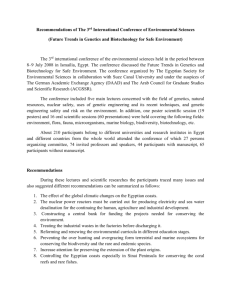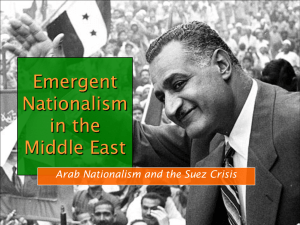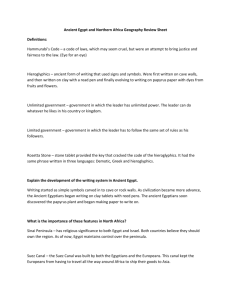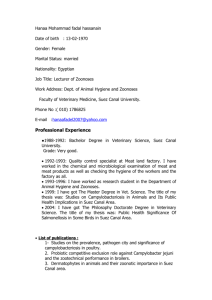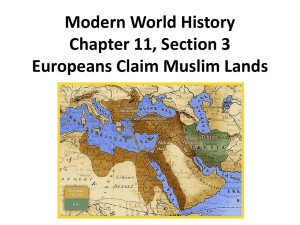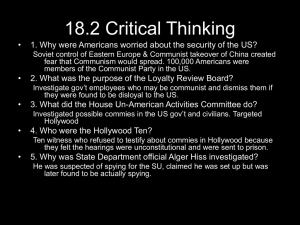Country: Belgium Committee: HSC Topic: Suez Crisis (October 29
advertisement
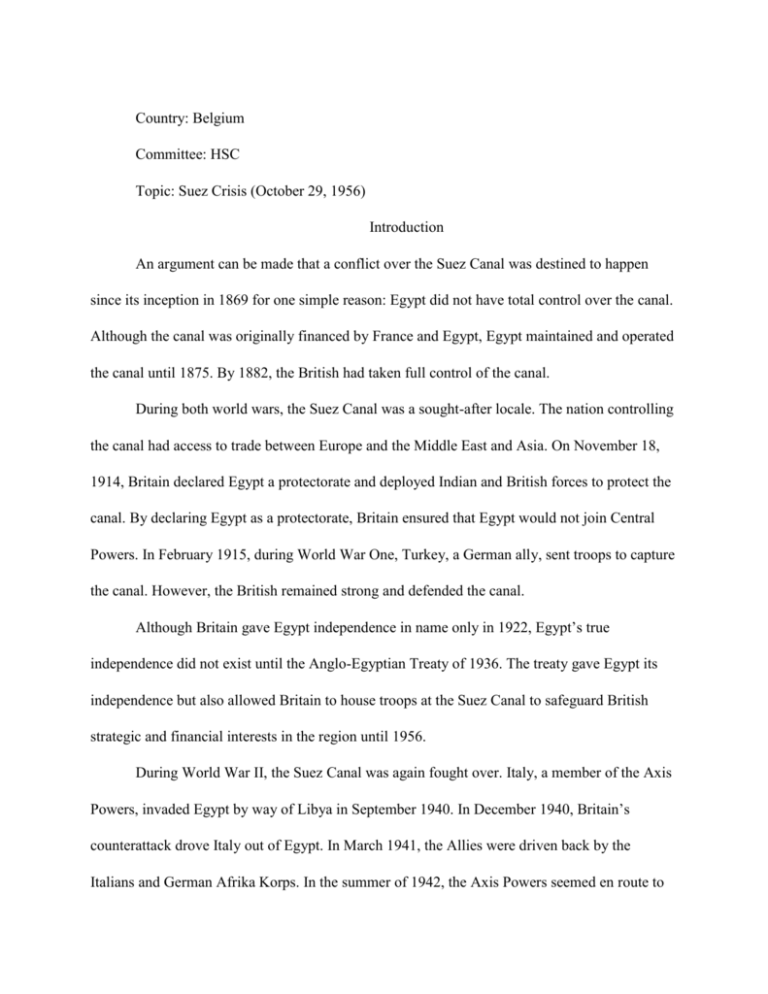
Country: Belgium Committee: HSC Topic: Suez Crisis (October 29, 1956) Introduction An argument can be made that a conflict over the Suez Canal was destined to happen since its inception in 1869 for one simple reason: Egypt did not have total control over the canal. Although the canal was originally financed by France and Egypt, Egypt maintained and operated the canal until 1875. By 1882, the British had taken full control of the canal. During both world wars, the Suez Canal was a sought-after locale. The nation controlling the canal had access to trade between Europe and the Middle East and Asia. On November 18, 1914, Britain declared Egypt a protectorate and deployed Indian and British forces to protect the canal. By declaring Egypt as a protectorate, Britain ensured that Egypt would not join Central Powers. In February 1915, during World War One, Turkey, a German ally, sent troops to capture the canal. However, the British remained strong and defended the canal. Although Britain gave Egypt independence in name only in 1922, Egypt’s true independence did not exist until the Anglo-Egyptian Treaty of 1936. The treaty gave Egypt its independence but also allowed Britain to house troops at the Suez Canal to safeguard British strategic and financial interests in the region until 1956. During World War II, the Suez Canal was again fought over. Italy, a member of the Axis Powers, invaded Egypt by way of Libya in September 1940. In December 1940, Britain’s counterattack drove Italy out of Egypt. In March 1941, the Allies were driven back by the Italians and German Afrika Korps. In the summer of 1942, the Axis Powers seemed en route to capturing the Canal. Surprisingly, the Allies still had control of the Canal in October 1942. On May 13, 1943, the Axis Powers surrendered. Most historians believe the roots of the Suez Crisis began at the conclusion of World War II. Nationalism in Egypt reached new heights. In October 1951, Nahas Pasha, the leader of the Wafd Party, nullified the Anglo Egyptian Treaty of 1936. Britain responded to attacks on their garrison by authorizing an operation to “disarm the Egyptian paramilitary force in Ismailia which was orchestrating the violence” (Milner). King Farouk dismissed Pasha as Prime Minister in January 1952 after Britain threatened to occupy Cairo. In July 1952, General Mohammed Neguib took power after a military coup. When Colonel Gamel Abdul Nasser succeeded Neguib in 1954, “he had three goals: to make Egypt independent by ending British occupation; to build up Egyptian forces for a successful attack on Israel; to improve Egypt’s economy by constructing a high dam at Aswan to irrigate the Nile valley” (Milner). In October 1954, Anthony Nutting, Britain’s minister of state for foreign affairs, and Nasser signed a treaty saying that Britain would “be withdrawn from Egypt by June 1956, and the British bases were to be run jointly by British and Egyptian civilian technicians. Egypt agreed to respect the freedom of navigation through the canal, and it was agreed that British troops would be permitted to return if the Suez Canal was threatened by an outside power” (Milner). Britain held up their part of the deal and began withdrawing their troops; while Britain withdrew their troops, Nasser bought Soviet-made weaponry in an attempt to complete his goal of destroying Israel. Nasser was on his way to completing two of his three goals he set when he came to power. Although Nasser was working with the Soviet Union, Britain and the United States pledged funds for the construction of the Aswan Dam in January 1956. However, on July 19, 1956, the United States retracted funding for the dam; soon after, both the World Bank and Britain followed the United States’ lead. A week later, Nasser responded by nationalizing the Anglo-French Suez Canal Company to compensate for the loss of funding. Additionally, Nasser also blocked Israeli shipping through the Canal, the Straits of Tiran, and the Gulf of Aqaba. Britain, Israel, and France saw a need to intervene in Egyptian affairs. Without informing the United States, Britain, France, and Israel conspired to attack Egypt. The plan, known as Operation Kadesh, was for Israel to invade the Sinai Peninsula and march toward the Suez Canal. At this point, Britain and France would warn Israel and Egypt to avoid the Canal. Israel launched the attack on October 29, 1956. The results are not yet known. Country Policy We, the Kingdom of Belgium, signed the North Atlantic Treaty on April 4, 1949. Although NATO is not involved in the Suez Crisis, we are a member of NATO and feel that Nasser is crippling not only the English and French economies but also the international economy. Nasser must at the very least reopen the Canal. Ideally, Nasser should be replaced by someone with a pro-Western policy to not only ensure European prosperity but also international prosperity. Solutions Middle Eastern nations applauded Nasser’s actions. Arab nations felt that Western influence had been present for too long and wanted to establish their own identity. Part of the anti-Western sentiment was caused by the support of Western nations for the creation of Israel. The anti-Western sentiment is understandable given our constant presence in Middle Eastern affairs; it was only a matter of time until these colonies wanted to establish their own identities. Nations should view Arab states with caution. They will certainly be looking to cause problems for Western nations and can be very persuasive given their large oil deposits. Appeasement is not the proper action; instead, compromise among nations is imperative. Nasser’s decision to block international trade through the Canal has not just affected Britain and France but also internationally. Several steps must be taken to ensure the Suez Crisis does not escalate into a world war. Peacekeepers must be stationed in three critical locations: at the Suez Canal, Cairo, and Port Said. There is a strong possibility that a conflict will ensue near Port Said because it leads to deep penetration into Egypt. Capturing Cairo is the objective of France, Britain, and Israel. Its capture demonstrates symbolic representation of superiority. Finally, stationing peacekeepers at the Suez Canal would prevent Israel from advancing past the Canal. We propose allowing Egypt to maintain control of the Canal on several conditions: Egypt must continue to pay shareholders in the Canal; they must ensure there are not any arbitrary Canal closures; finally, Egypt and any other Arab nation must not attack Israel. As long as those conditions are met, Egypt may control the Suez Canal. Additionally, the Suez Crisis provides the Soviet Union with a unique opportunity. Upon succeeding Stalin, Khrushchev called for peaceful coexistence with the West. The situation in Suez is an opportunity for him to demonstrate how peacefully the West and the Soviet Union will coexist. The key to ensuring that Soviets do not interfere is to provide incentives to them, specifically regarding arms trade. Provided that the Soviet Union stops supplying nations with arms, Western nations will do the same. Works Cited "An Affair to Remember." The Economist. The Economist, 27 July 2006. Web. 20 Jan. 2013. Calhoun, Ricky-Dale. "The Art of Strategic Counterintelligence." Cia.gov. Central Intelligence Agency, 26 June 2008. Web. 31 Jan. 2013. "Egypt: A Constitution." Time.com. Time Magazine, 28 Apr. 1928. Web. 25 Jan. 2013. "The First Mission- Suez Crisis, 1956." Unac.org. United Nations Association in Canada, 2007. Web. 14 Jan. 2013. "LESTER PEARSON & THE SUEZ CRISIS." LESTER PEARSON & THE SUEZ CRISIS. N.p., n.d. Web. 31 Jan. 2013. "A Look Back … U-2 Monitors Suez Crisis." Cia.gov. Central Intelligence Agency, 12 Nov. 2009. Web. 24 Jan. 2013. "Milestones- Suez Crisis, 1956." History.state.gov. Office of the Historian, n.d. Web. 28 Jan. 2013. Milner, Laurie. "The Suez Crisis." BBC News. BBC, 3 Mar. 2011. Web. 31 Jan. 2013. "Suez Canal Crisis." Cbc.ca. N.p., 2001. Web. 31 Jan. 2013. "The Suez Fiasco 1956." Socialism Today - The Suez Fiasco 1956. N.p., Oct. 2006. Web. 31 Jan. 2013. Committee: Historical Security Council Topic: The Situation in Hungary (1956) Country: Belgium 1. Introduction On October 9, 1944, Joseph Stalin hosted a war summit in his apartment and invited Winston Churchill. The two men discussed dividing up territory in the Balkans between the Soviet Union and Great Britain. After Churchill proposed a ‘percentage deal’ in which he tried to evenly distribute the land between both nations. Hungary was to be split 50/50, 90% of Romania would belong to Russia, and 90% of Greece would go to Great Britain. Stalin rejected this offer and the next day his troops crossed through Ukraine into eastern Hungary. After World War II in May 1945, Russian troops still remained in Hungary and Stalin still hoped to further expand upon his existing communism empire. The Hungarians were a patriotic people and hated Russian control, especially the secret police, also known as the AVH; Russian control over their economy, making Hungary poor; Russian control of school curriculum; censorship and overall lack of freedom. 1 But in 1949, Hungarian anger was fueled when they were pushed to sign a mutual assistance treaty with the Soviet Union, which would give the Soviets the right to a continued military presence. 2 Over time, Hungary went from a “freely elected Independent Small Holders Party” to a Soviet-backed Hungarian Socialist Workers' Party led by Matyas Rakosi. Rakosi began the transition of Hungary into a communist country by setting up an authoritarian regime. He was successful with this transition because he purged the country of all any and every obstacle that would politically challenge him. The victims of these purges were also known as Titoists. With so much focus on the politics in the country, he 1 2 http://www.bbc.co.uk/schools/gcsebitesize/history/mwh/ir2/hungaryrev2.shtml http://www.budapest-life.com/budapest/1956-hungarian-uprising neglected the economy, which led to declines in the quality of life for all Hungarians. Fortunately for the Hungarians, Stalin’s death on March 5, 1953 ended the strict Soviet rule.3 In June, Rakosi and other communist leaders went to Moscow where Soviet leaders for the poor economy in Hungary criticized them. The Soviet communist party president, Lavrenti Beria, condemned Rakosi for putting Jews into Hungary’s top party positions and Rakosi was accused of trying to become the “Jewish King of Hungary”. As a result, Soviet leaders appointed Imre Nagy as Prime Minister of Hungary and Rakosi was able to keep his position as party chief. 4 Imre Nagy disagreed with the ideas of Rakosi and worked to change things for the better. The idea of collectivization was no longer harshly stressed and the manufacturing of consumer goods was encouraged. He also freed anti-Communists from jails and lifted state control over the media. 5 Rakosi was not satisfied with Nagy’s actions and campaigned against him in order to remove Nagy from his position. He argued that it would be more beneficial for Hungarians to return to communism under Russian leadership. In March 1956, Nikita Khrushchev gave a secret speech criticizing Stalin at the 20th Party Congress. 6 This speech initiated a campaign of destalinization throughout the Soviet bloc. Destalinization led to a policy of a decrease in strained relations between countries and peaceful coexistence among Western and satellite nations. 7 According to Khrushchev, this movement would mark the end of Soviet control over Eastern Europe. This new policy http://libcom.org/history/1956-the-hungarian-revolution http://countrystudies.us/hungary/37.htm 5 http://www.historylearningsite.co.uk/imre_nagy.htm 6 http://fog.ccsf.cc.ca.us/~sgati/gatiproductions/starting_over/revolution.htm 3 4 7 http://www.umich.edu/~historyj/pages_folder/articles/Soviet_Intervention_in_the_Hung arian_Revolution_of_1956.pdf became very widespread in Poland during summer and fall of 1956. The Polish demonstrated their thoughts on the situation via anti-Soviet rebellions and reform minded government. Such unrest in Poland caught the attention its surrounding countries including Hungary. The Hungarians were furious with the state that their beloved country was in and Prime Minister Nagy’s promises for independence and political freedom fueled this anger. 8 On October 23, 1956, students in Budapest held a rally to support Poland’s fight for self-government from the Soviet Union. This rally sparked violent demonstrations involving fighting between the police and Hungarian rebels. The Soviet Party leader in Hungary, Erno Gero, was alarmed by the violent opposition by the Hungarians and called for military assistance. On October 24, 1956, Soviet troops had officially invaded Hungary and the fighting had begun.9 2. Country Policy Ever since April 4, 1949, Belgium has been a member of the North Atlantic Treaty Organization.10 The Secretary-General of NATO called the Hungarian revolt "the collective suicide of a whole people".11 The countries of NATO were obviously concerned with the well being of the Hungarian people and felt the need to take action and help in any way possible to restore peace to the international community. Being a country in Western Europe and a member of NATO, we are influenced politically by this issue in that this situation creates tensions in the overall European bloc. We strongly believe in aiding the civilians of Hungary and preventing any refugees from 8 http://news.bbc.co.uk/onthisday/hi/dates/stories/november/4/newsid_2739000/27390 39.stm 9 http://www.globalsecurity.org/military/world/war/hungary.htm 10 http://www.nato.int/cps/en/natolive/topics_52044.htm#About 11 http://erwin.bernhardt.net.nz/hungarian1956revolutionwiki.html fleeing the country. Belgium, along with NATO, believes that Hungary should have the freedom to choose their own government without any outside forces or threats influencing them to change their way of life against is will. 12 Every country deserves the right to national sovereignty and the Soviet Union is clearly infringing upon Hungary’s national sovereignty. 3. Proposed Actions and Solutions The country of Belgium believes that the ultimate priority in solving this situation is the humanitarian aspect. The people of Hungary are suffering due to violence between rebels and the Soviet army. In order to prevent further fleeing of refugees into nearby countries, mainly Austria and Yugoslavia13, Belgium feels the need to give Hungarians a reason to stay in their country as they wait for this violent period to pass. The International Committee of the Red Cross, or the ICRC, established in 1863, works internationally to provide humanitarian aid to those affected by conflict and violence and to promote laws that protect these victims of war.14 The ICRC is funded by government donations and Red Cross and Red Crescent societies. By improving living conditions and giving medical attention to Hungarian citizens, Belgium is certain that the number of Hungarian refugees in neighboring countries will be significantly reduced. Furthermore, in the interest of peace in the international community, there is an obvious need to rid Soviet control over Hungary as soon as possible. In order to prevent a possible World War 3, this transition needs to be dealt with in the most humanitarian and effective way possible. Belgium would first like to establish an armistice in the interest of http://www.coldwar.hu/html/en/publications/kecskes_1956.html https://www.cia.gov/library/center-for-the-study-of-intelligence/kentcsi/vol2no1/html/v02i1a07p_0001.htm 14 http://www.icrc.org/eng/who-we-are/index.jsp 12 13 saving lives on both sides of this conflict. During this armistice, it would be in the best interest of both parties to discuss ways to calmly resolve this situation. In order to create an effective and sustainable solution to this problem, both sides should both benefit from creating peace whether it be through trade, currency, or any other means possible. Along with the rest of the world, Belgium wishes for a quick end to this situation, but it is imperative that both sides are satisfied with the end product.

